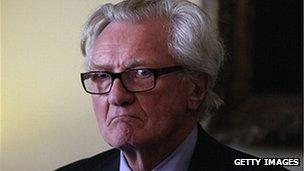Will David Cameron ape Tarzan?
- Published
- comments

Lord Heseltine said the report was "one man's vision"
"The message I keep hearing is that the UK does not have a strategy for growth and wealth creation."
That one sentence alone is a gift to Ed Miliband particularly on the day of Prime Minister's Questions. All the more surprising then that it comes from a report commissioned by the government and written by a former Conservative Deputy Prime Minister. This is a war cry from the man whose golden locks and virtuoso performances earned him the nickname Tarzan.
Lord Heseltine insists that he is simply urging his friends in government to go further and faster - not so much a critic, as a coach or an adviser to a top athlete or business leader who wants to improve his or her performance
It is true that he is not backing Labour's call for more spending and borrowing. Nor is he backing calls from the Tory right for an assault on regulation and tax cuts. Instead, the man who once boasted to the Conservative conference that he would "intervene before breakfast, lunch and dinner" to use the power of government to help business is now calling on the prime minister to do exactly that and to restructure the British state to achieve it.
In the short term - and providing more lines for the government's critics to deploy - Hezza calls on ministers to come off the fence about building a new hub airport and to resolve the simmering row between ministers over future energy policy. This is an echo of what any business organisation would tell you.
More surprising and more challenging is the Heseltine prescription for a wholesale re-organisation of the way government works for business. The man who dubbed himself President of the Board of Trade in the 1990s now wants the prime minister to head a new national board - or Growth Council - to force the government to focus on delivering growth.
A new minister - perhaps Lord Deighton, newly appointed to the Treasury having finished building the infrastructure of the Games - would be specifically assigned to the job.
So far, so much Whitehall tinkering. What is more dramatic is Hezza's call to re-organise the British state along German lines.
Power and money to control billions of funds should, he says, be taken from competing Whitehall baronies and given to the newly created but currently under-powered Local Enterprise Partnerships to spend on their local priorities instead.
Business should be forced or cajoled to join and be represented by newly beefed-up Teutonic Chambers of Commerce. English local government should be re-organised on Welsh and Scottish lines - producing single unitary councils in England in place of the current hotch potch of districts, counties, metropolitan and unitary councils.
The vision embodied in this report is that government should produce a national plan for growth - picking winning sectors if not individual firms it wants to back - and every local area should have a legal requirement to produce their own plan which fits in with it.
Lord Heseltine has written not so much a single report as a potted autobiography of his time in government. He is calling on David Cameron to adopt the approach of top down control, partnership between government and business, but above all single minded focus, energy and impatience which helped create the London docklands and tried, with much less success, to revive Liverpool.
The question today then is not whether David Cameron and George Osborne welcome this report or insist that they knew what they were doing when they commissioned it. It is not whether they talk of adopting his idea of this Whitehall committee or that devolution of funds.
It is whether these two children of Thatcher can ever see themselves as bosses of UK PLC rather than politicians whose job it is to limit regulation, taxes and other annoyances to business. Hezza says they have backed him all the way and that what matters is what ministers think and not the Whitehall institutions they lead.
So, the question today is whether Cameron can ever really become Tarzan - and whether his party would let him?